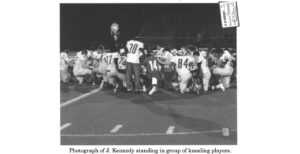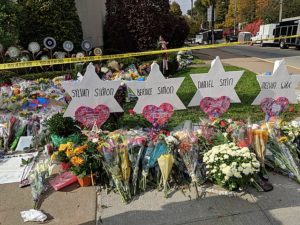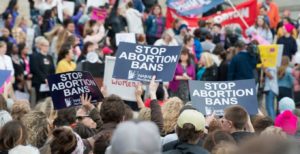Several recent decisions by the United States Supreme Court, as well as the July 4th massacre in Highland Park, Illinois, and other acts of violence closer and further from home, have left many Jews feeling particularly vulnerable, anguished, and aggrieved.
We, the Jewish Community Relations Council of Minnesota and the Dakotas, the consensus public affairs voice for Minnesota’s Jewish community, and the Minnesota Rabbinical Association, have the responsibility to articulate our perspective on these vital issues, and we do so not as Democrats, Republicans, or Independents, but as Americans and as Jews.
We appreciate that there is never just one Jewish perspective on anything. Still, a lack of unanimity has never prevented us from speaking where there is consensus on issues of great concern to our Jewish community ranging from advocating for the safety of Israel, combatting antisemitism from across the political spectrum, or opposing Minnesota’s 2012 Marriage Amendment.
Three recent landmark decisions by the Supreme Court on school prayer, abortion, and guns matter to us not just as Jewish individuals, but as a community that is gravely concerned that the upending of decades-old precedents threatens our religious identity, values, freedom, safety, and equal rights as citizens of this great nation.
No Jewish student should ever have to choose between their Judaism and being fully included in their public school
Jews have flourished in the United States in large part because, at least in principle if not always in practice, there is no contradiction between being fully Jewish and fully American. The foundations for this perhaps uniquely American condition are the free exercise and establishment clauses of the First Amendment.
Within the context of our public schools, this means there is no contradiction between vigorously advocating for accommodations in the school calendar so that families can observe religious holidays and an expectation that no student should ever feel pressured into joining a faculty or staff-led sectarian prayer group. At the same time, we have long advocated that our students must be educated about the full spectrum of religious traditions in our public schools. To that end, the JCRC in coordination with the MRA has actively been involved with the ongoing revision of Minnesota’s Social Studies Standards and Benchmarks to ensure that Judaism, as well as other world religions, are taught to Middle School and High School students.

A photo from the case Kennedy v. Bremerton School District shows a football coach leading a prayer at midfield of a high school football game. (Photo courtesy Supreme Court).
This balance between the free exercise and establishment clauses was greatly undermined by the Supreme Court’s decision in Kennedy v. Bremerton School District, which essentially required a Washington State school district to permit a high school football coach to pray on the 50-yard line publicly after the conclusion of each game.
Though the Supreme Court majority claims that this was an instance of private prayer, the facts laid out in the dissent, including photographs that documented much of the team kneeling around their coach, demonstrate that this prayer was anything but private or personal.
Moreover, the record clearly shows that the coach-initiated public prayer had a powerful gravitational pull which forced some players to choose between the tenets of their religion and socialization into the dominant faith of their team. No public school student should ever have to make such a choice. For the reasonable observer, this well publicized and demonstrative act of public devotion appeared to be as much a part of the game as the performance of our national anthem.
We do not envy the administrators of our local school districts, including those who regularly seek out and/or partner with the JCRC and the MRA, in navigating the legal landscape in the wake of Kennedy and the effective reversal of Lemon vs. Kurtzman. For over half a century, Lemon provided a sensible three-prong test for units of government, including school districts, to evaluate potential violations of the Establishment Clause.
We urge districts in Minnesota and the Dakotas to continue to allow their students to fully express their religious identities and faith, while at the same time requiring that their faculty and staff take no part in proselytizing or organizing sectarian prayer or public acts of devotion in school or at school-sanctioned events.
The end of Roe endangers the poor and threatens other deeply engrained liberties
On the subject of choice, can there be any decision more personal than the right to control one’s own body or healthcare?
The reversal of Roe v. Wade and the constitutional right to abortion overturns a half-century of settled constitutional law that guaranteed women the freedom and dignity to make the most intimate of choices for themselves without the heavy hand of government forcing them to undergo the risks of pregnancy and giving birth against their will.
Millions of Americans have suddenly become less free, less equal, and less autonomous in the eyes of the law. There is no neutrality in subjecting the most essential of personal liberties – the right to bodily autonomy – to the will of state legislatures.
The brunt of Dobbs v. Jackson Women’s Health Organization will fall most severely on poor women, especially from minority communities, for whom access to safe and legal abortion will be difficult if not impossible to obtain. By contrast, Americans of means will find it much easier to access abortion services in states where abortion remains legal, as was the case even prior to Roe. Justice Harry Blackmun, a Minnesotan, strongly considered this reality in writing the majority opinion in Roe.
We note approvingly Monday’s Minnesota state court decision, Doe v. Minnesota, which, consistent with Minnesota Supreme Court precedent, guarantees access to safe and legal abortion within our state. As states move in opposite directions on access to abortion there will undoubtedly be increased demand here from fellow Americans beyond our borders. We applaud the work being done by our partner agencies to ensure that all in need, irrespective of means and geography, have access to safe and legal abortions in the wake of the Dobbs ruling, and encourage participation in this Sunday’s rally in St. Paul for reproductive rights.
For two generations of Americans, the right to safe and legal abortions was a settled expectation that had withstood countless challenges and had most prominently been preserved under Casey by justices nominated by Presidents Nixon, Ford, Reagan, and George H.W. Bush. It certainly was settled for a significant majority of the American Jewish community and its communal institutions. As the board of the Jewish Federations of North America recently wrote in the wake of Dobbs:
“The issue of reproductive rights is of great importance…We know the Supreme Court’s decision to overturn Roe v. Wade will have a tremendous impact on our communities. We pledge to continue our decades-long history of providing support and resources to our health and human service agencies to ensure the well-being of all women.”
There is ample basis – be it religious, ethical, or historical – for why 83% of American Jews believe that abortion should be legal in all or most cases. Our religious convictions are no less sincerely held and no less worthy of constitutional protection than those of other Americans.
Grounded in the 14th Amendment’s promise of due process, the right to reproductive choice is deeply interconnected with other constitutional rights such as the right to marry someone of a different race or of the same sex, the right to purchase contraception, or even the right to resist forced sterilization. Accordingly, we take seriously the warning by Justice Clarence Thomas in his concurring opinion that the constitutional right to contraception, marriage equality, and to have consensual sexual relations in the privacy of one’s own home are at risk of being struck down by the Court in future cases.
While such rulings would be broadly unpopular, they would also be the logical outcome of the reasoning employed by the current Supreme Court majority when it dismantled the constitutional right to safe and legal abortion. If, in the view of the current Supreme Court majority, abortion, which has been legal for almost a half century, is not sufficiently “deeply rooted in history” then the viability of marriage equality, which has only been considered a protected constitutional right for less than a decade, must be at risk as well.
After Bruen, common sense gun violence prevention laws are now at risk
Just a few days ago the JCRC wrote:
“Our hearts remain heavy in the wake of the horrific mass shooting at the 4th of July parade in Highland Park, IL. It is clear this unspeakable act of violence will have a lasting impact on the Highland Park community generally, and in particular its Jewish community — which is deeply connected to our Minnesota Jewish community through family ties, summer camp friendships, and other deep connections.
We mourn the loss of the seven murdered victims and wish refuah shlema – a complete healing of mind, body, and spirit – to the many more who are injured and traumatized. At the same time, we cannot ignore the shameful fact that a person who was known to authorities for threatening and glorifying violence was able to legally purchase a semiautomatic rifle. As a society, we must refuse to accept such horrors as the inevitable cost of ‘freedom’ in America.”
Many members of the MRA shared similar sentiments with their congregations.

Memorials outside the Tree of Life Synagogue in Pittsburgh following the 2018 shooting that killed 11 congregants.
Expressions of extreme sorrow in the wake of other recent mass shootings, accompanied by a vow to stem the tide of unrelenting gun violence, have been repeated more times than any of us can bear to count. And though we are somewhat heartened by the modest bipartisan bill which Congress recently passed to begin to address the epidemic of gun violence, we are concerned that the Supreme Court’s recent decision in New York State Rifle & Pistol Assn., Inc. v. Bruen will bring forth a wave of constitutional challenges to our nation’s existing gun laws and make future reforms even more difficult to pass.
For the JCRC, the organization principally responsible for our community’s security, Bruen could make it materially more difficult for us and our law enforcement partners to do our work as we rely upon not just our own resources, training, and relationships, but also the enforcement of common-sense regulations to minimize the risks of gun violence. We know that in states with more robust gun laws there is a positive correlation with reduced gun violence. The opposite is true in states with weaker gun laws.
Now, for the first time, courts will be required to review sensible gun violence prevention statutes for whether they are solely consistent with 18th and 19th Century sensibilities. Instead, courts should be allowed to continue to perform their historical role of striking an appropriate and sensible balance between public safety and the right of individuals to keep and bear arms.
The Jewish answer is never to despair, but to raise our collective voices
We know these decisions are especially unsettling to the younger generations of American Jews who are most directly impacted by the loss of reproductive choice, who are at risk for school shootings, or who are concerned about being forced to join in sectarian prayer at school. For older members of our community, these decisions challenge our long-held assumptions about how courts are expected to interpret the Constitution considering the numerous venerable precedents which recognized that the Supreme Court must interpret the Constitution consistent with contemporary realities.
As always, the Jewish answer is never to despair. In the words of Rabbi Lord Jonathan Sacks z”l:
“To be a Jew is to be an agent of hope in a world serially threatened by despair. Every ritual, every mitzvah, every syllable of the Jewish story, every element of Jewish law, is a protest against escapism, resignation or the blind acceptance of fate. Judaism is a sustained struggle, the greatest ever known, against the world that is, in the name of the world that could be, should be, but is not yet.”
We know that the road ahead will be extremely difficult and that it will take time to undo the damage done by these misguided decisions. The JCRC and our rabbinic leaders will continue to stand with our community in this fight so that our religious identity, values, freedom, and safety, as well as our equality as citizens of this great nation, are valued and protected.
Steve Hunegs, is the Executive Director and Ethan Roberts, J.D. is the Director of Government Affairs for the JCRC. Rabbis Debra Rappaport, Tamar Magill-Grimm, and Lynn Liberman are the MRA’s co-chairs.


